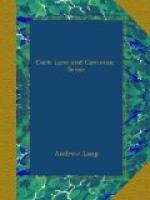called into the dormitory of ’les enfans,’—novices,—with
holy water and everything proper. Knocking was
going on, and by a system of knocks, the spirit said
it wanted its body to be taken out of holy ground,
said it was Madame St Mesmin, and was damned for Lutheranism
and extravagance! The experiment was repeated
before churchmen and laymen, but the lay observers
rushed up to the place whence the knocks came where
they found nothing. They hid some one there,
after which there was no knocking. On a later
day, the noises as in Cock Lane and elsewhere, began
by scratching. “M. l’Official,”
the bishop’s vicar, ’ouit gratter, qui
etoit le commencement de ladite accoutummee tumulte
dudit Esprit’. But no replies were given
to questions, which the Franciscans attributed to
the disturbance of the day before, and the breaking
into various places by the people. One Alicourt
seems to have been regarded as the ‘medium,’
and the sounds were heard as in Cock Lane and at Tedworth
when he was in bed. Later experiments gave no
results, and the friars were severely punished, and
obliged to recant their charges against Madame de
Mesmin. The case, scratches, raps, false accusations
and all, is parallel to that of the mendacious ‘Scratching
Fanny,’ examined by Dr. Johnson and Douglas,
Bishop of Salisbury. In that affair the child
was driven by threats to make counterfeit noises,
but, as to the method of imposture at Orleans, nothing
is said in the contemporary legal document.
We now turn to the account by Sleidan, in Wierus.
The provost’s wife had left directions for
a cheap funeral in the Franciscan Church. This
economy irritated the Fathers, who only got six pieces
of gold, ‘having expected much greater plunder’.
‘Colimannus’ (Colimant), an exorcist
named in the process, was the ringleader. They
stationed a lad in the roof of the church, who rapped
with a piece of wood, and made a great noise ’when
they mumbled their prayers at night’.
St. Mesmin appealed to the king, the Fathers were
imprisoned, and the youth was kept in Fumee’s
house, and plied with questions. He confessed
the trick, and the friars were punished. Of
all this confession, and of the mode of imposture,
nothing is said in the legal process. From the
whole affair came a popular saying, c’est l’esprit
d’Orleans, when any fable was told. Buchanan
talks of cauta parum pietas in fraude paranda.
The evidence, it may be seen, is not very coherent,
and the Franciscans may have been the deceived, not
the deceivers. {117} Wierus himself admits that he
often heard a brownie in his father’s house,
which frightened him not a little, and Georgius Pictorius
avers that a noisy spirit haunted his uncle’s
house for thirty years, a very protracted practical
joke, if it was a practical joke. {118} This was
a stone-throwing demon.




